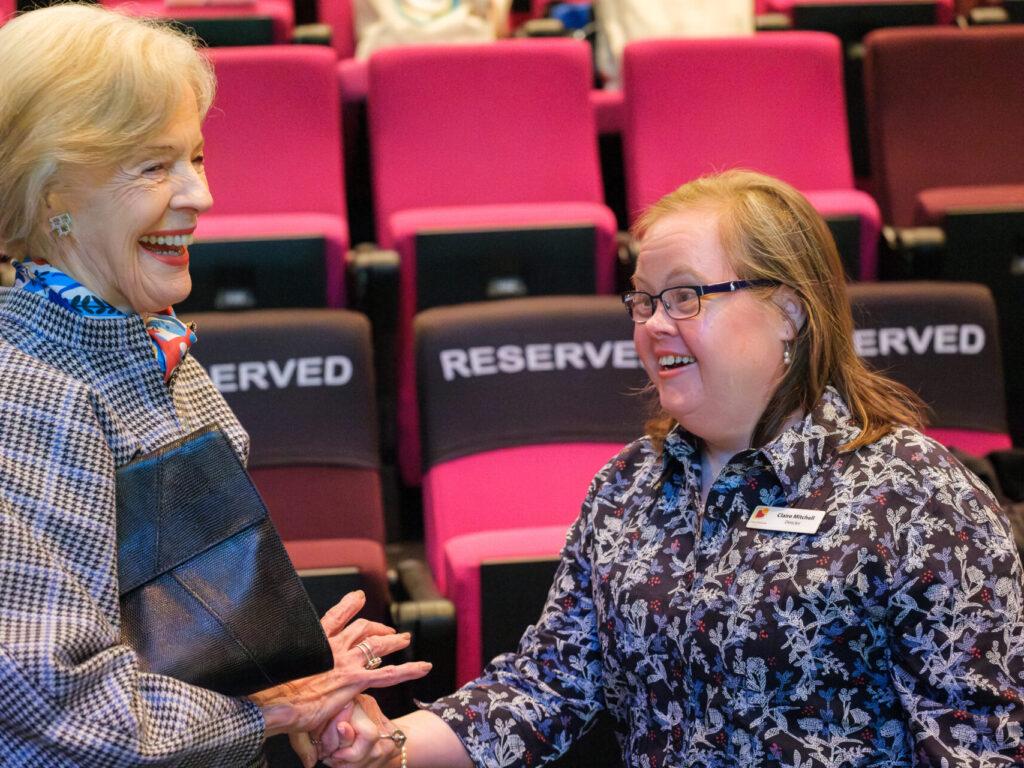Being on the Board of Down Syndrome Australia
Down Syndrome Australia (DSA) is proud to have two members with Down syndrome on our Board. Their lived experience is vital in shaping our work, helping ensure our decisions and advocacy reflect the real needs of our community.
We spoke with Board members Michael Cox and Claire Mitchell, to learn more about their roles, their motivations and why having people with Down syndrome in governance matters.
Michael Cox – Board Member since 2025
“I’ve always wanted to create a better world and a better society. Now that I’m on the Board, I can contribute to making life better for people with disabilities, particularly Down syndrome. It’s my destiny. It’s the reason I exist.”

What does your role involve?
I attend quarterly Board meetings and prepare by reading all the papers. Being prepared helps me contribute fully. I’ve also joined the Nominations and Governance Committee, which lets me be involved in more of the Board’s work.
What do you enjoy about being on the Board?
I enjoy spending time with the DSA CEO, Darryl Steff, and the other Board members. I like learning how DSA is helping society work together and support people with Down syndrome.
Why is it important for people with Down syndrome to be in positions like this?
It’s extremely important so that Boards and Governments hear directly from people with lived experience. Decisions are then made for people with disabilities, not just for the organisation.
Anything else to add?
I believe in working together and uniting society “Elmayirah, we’re stronger together.
“Elmayirah” (or El mayarah) is a Kryptonian phrase and the family motto of the House of L, meaning “stronger together”. It reflects the idea that individual strength comes from helping others, and true progress and strength arise from unity, hope, compassion, and collective action.
Claire Mitchell – Board Member since 2020
Claire Mitchell, from Queensland, joined DSA’s Board in 2020 as the first Independent Director with Down syndrome.
My name is Claire Mitchell and some of the things that mean a lot to me are my family and friends, staying healthy, living independently, my faith and most importantly being a voice for people with Down syndrome.

Why I decided to join the DSA Board
I live a fulfilling life and I like to keep busy. I work part time in office administration at the Queensland Childrens’ Hospital School, and I’m an Independent Director on the board of Down Syndrome Australia along with other roles in my community and enjoy the connection of my friendship networks.
As one of the first members of the DSAN, I learnt so much and gained a lot of experience. One of my strengths is communication and I wanted to use my voice to advocate for people with Down syndrome and other intellectual disabilities. I am very passionate and committed to my role.
What my role on the Board involves
I am proud to be an Independent Director on the DSA Board. I feel I am listened to and valued on an equal footing with all Board members. I respect the formality of the meetings and attending to the business of the Board. I am well supported by my personal assistant on Board matters. Together we prepare for Board meetings by reading through all the documents and making notes and I am supported throughout the meetings. I keep myself informed on topics relevant to my community by reading, watching videos and being involved in community activities.
What I enjoy about being on the Board
I enjoy being part of a team of people working towards the common goal to achieve the best outcomes in the lives of people with Down syndrome. It is important to me to be professional and follow the meeting etiquette. I enjoy the process of getting prepared for meetings, the structure and the thinking process. I care greatly for all people with Down syndrome and am proud to show that I have the ability to contribute on the board.
Why I think it’s important for people with Down syndrome to be in positions like this one
I think it is very important that people with Down syndrome have the right to be on Boards and that they need to have opportunities to be on Boards.
In line with the Convention on the Rights of People with Disabilities, it is vital that people with lived experience of disability are involved in organisations, either in advisory and public speaking roles and in governance, ensuring their voices and opinions are heard.


